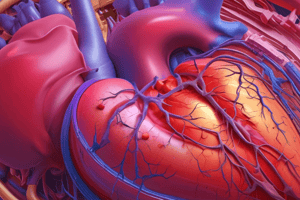Podcast
Questions and Answers
What does an increase in preload primarily affect in the heart's performance?
What does an increase in preload primarily affect in the heart's performance?
- It increases the heart rate significantly.
- It reduces the resistance against blood ejection.
- It decreases the volume of blood in the ventricles.
- It strengthens the force of contraction. (correct)
How does increased afterload affect the heart?
How does increased afterload affect the heart?
- It leads to an increase in preload.
- It decreases heart's contraction strength.
- It causes a decrease in the stroke volume. (correct)
- It reduces the risk of left ventricular hypertrophy.
Which of the following is a method by which drugs can decrease preload?
Which of the following is a method by which drugs can decrease preload?
- By dilating veins to increase blood flow. (correct)
- By increasing heart rate to expel more blood.
- By relaxing blood vessels in the arterial system.
- By constricting veins to reduce blood volume.
What is the effect of high resistance on the heart due to increased afterload?
What is the effect of high resistance on the heart due to increased afterload?
What happens to cardiac output when preload increases?
What happens to cardiac output when preload increases?
Flashcards
Preload Definition
Preload Definition
Amount of blood in ventricles after diastole (EDV).
Preload Effect on Heart
Preload Effect on Heart
Increased blood volume stretches ventricles, leading to stronger pump.
Afterload Definition
Afterload Definition
Resistance blood faces leaving the heart.
Afterload Effect on Heart
Afterload Effect on Heart
Signup and view all the flashcards
Afterload Drug Effect
Afterload Drug Effect
Signup and view all the flashcards
Study Notes
Preload
- Same as EDV; amount of blood in ventricles after diastole
- Increased preload stretches ventricles, causing stronger contractions
- Stronger contractions increase stroke volume and cardiac output
- Drugs can affect preload by dilating or constricting veins, affecting preload
Afterload
- Resistance against blood as it is pumped out of the heart
- Blood from the left ventricle (LV) must push against blood already in the aorta
- Increased resistance (e.g., stenosis, high blood pressure) makes the heart work harder
- Continued high resistance (e.g., hypertension) can cause LV hypertrophy (enlargement)
- Drugs can alter afterload by relaxing or dilating blood vessels in the periphery
- This reduces the workload on the heart
- Drugs that constrict blood vessels increase afterload, increasing the workload on the heart.
Studying That Suits You
Use AI to generate personalized quizzes and flashcards to suit your learning preferences.




